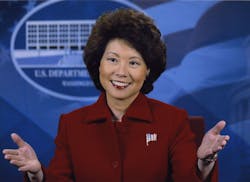Days before the Trump administration is expected to release its fiscal 2018 budget plan, senators asked Department of Transportation Secretary Elaine Chao to restore funding for a popular grant program.
The Transportation Investment Generating Economic Recovery (TIGER) program was part of the 2009 stimulus law, and has been popular among states and local governments ever since. However, no funding was included in the president’s “skinny” budget issued in March.
At a Senate Environment and Public Works Committee hearing on May 17, senators from both parties said TIGER grants leverage private investment, a stated goal of the administration, and should be revived as the blueprint for a $1 trillion infrastructure plan is finalized in the coming weeks.
“I know how popular they are with members of Congress,” Chao told the committee. “This particular issue about TIGER grants is something we are discussing. There may be a more holistic approach to infrastructure, and perhaps these TIGER grants will be recast in the future.”
Chao said she was not sure whether TIGER funding would be included when a full budget proposal is issued next week. Separately, she said winners of the FASTLANE grant program, created out of the FAST Act, would soon be announced.
The TIGER issue was first raised by Sen. Mike Rounds (R-SD), who singled out a $14.6 million grant, miniscule when discussing a $1 trillion bill, to highlight how powerful the grants can be.
That award was given to the Rosebud Sioux Tribe to pave a dangerous gravel road leading to Highway 83, offering jobs and an economic lifeline to an extremely poor county.
“This is small in nature, but important,” Rounds said. “Rest assured we would love to give additional input and advice” regarding the grants.
Sens. Tom Carper (D-DE) and Tammy Duckworth (D-IL) were others voicing support for TIGER.
The two-hour hearing was a mostly cordial gathering, with Chao and senators expressing a joint commitment to work together on infrastructure.
Chao provided few new details, again saying an initial plan will be issued within weeks.
She did emphasize the importance of streamlining the permitting and review process in order to get highway projects built more quickly.
Chao said it could be done “in way that is responsible,” with a focus on removing hurdles viewed as duplicative and only serve to slow down projects.
Sen. James Inhofe (R-OK) stressed the importance of this step, and said he did not believe earlier congressional efforts to accomplish that goal had been properly implemented under the Obama administration.
In his opening remarks, EPW Chairman John Barrasso (R-WY) encouraged a formula-based approach to distribution funds to ensure rural and urban states all receive their fair share.
"Using a formula-based approach will expedite the delivery of additional infrastructure spending which will ensure highway projects will be built faster, as opposed to adopting a new funding structure that is less understood by stakeholders," he said.
Sen. Deb Fischer (R-NE) was among several who inquired specifically about planning for freight projects.
Chao responded she is well aware of what is at stake.
“Freight is a very important part of our overall commerce and helps keep the economy vibrant,” she said. “We will do everything we can to facilitate commerce so it brings greater vitality and prosperity to our country.”
There was also consensus at the hearing that public-private partnerships should be part of the overall plan, but some cautioned it was only a small piece of the overall puzzle.
Many states have not yet considered PPPs, and Texas recently rejected a bill that would allow use of them to fund highway projects.
That feeling was shared by senators representing rural areas, where needed projects may not have a high-enough price tag to make PPPs a favorable option.
Conversely, Sen. Richard Shelby (R-AL) indicated more PPPs should be considered.
“We should not discriminate against the private sector in their desire to help finance” these projects, he said.
Throughout the hearing, a familiar chorus of funding options was raised, from raising fuel taxes, increasing the use tolling, especially on new highways, and implanting a vehicle miles tax.
Beyond highway infrastructure, funding needs for passenger transit and water infrastructure were other main discussion areas.
About the Author
Neil Abt
Neil Abt is a former FleetOwner editor who wrote for the publication from 2017 to 2020. He was editorial director from 2018 to 2020.
